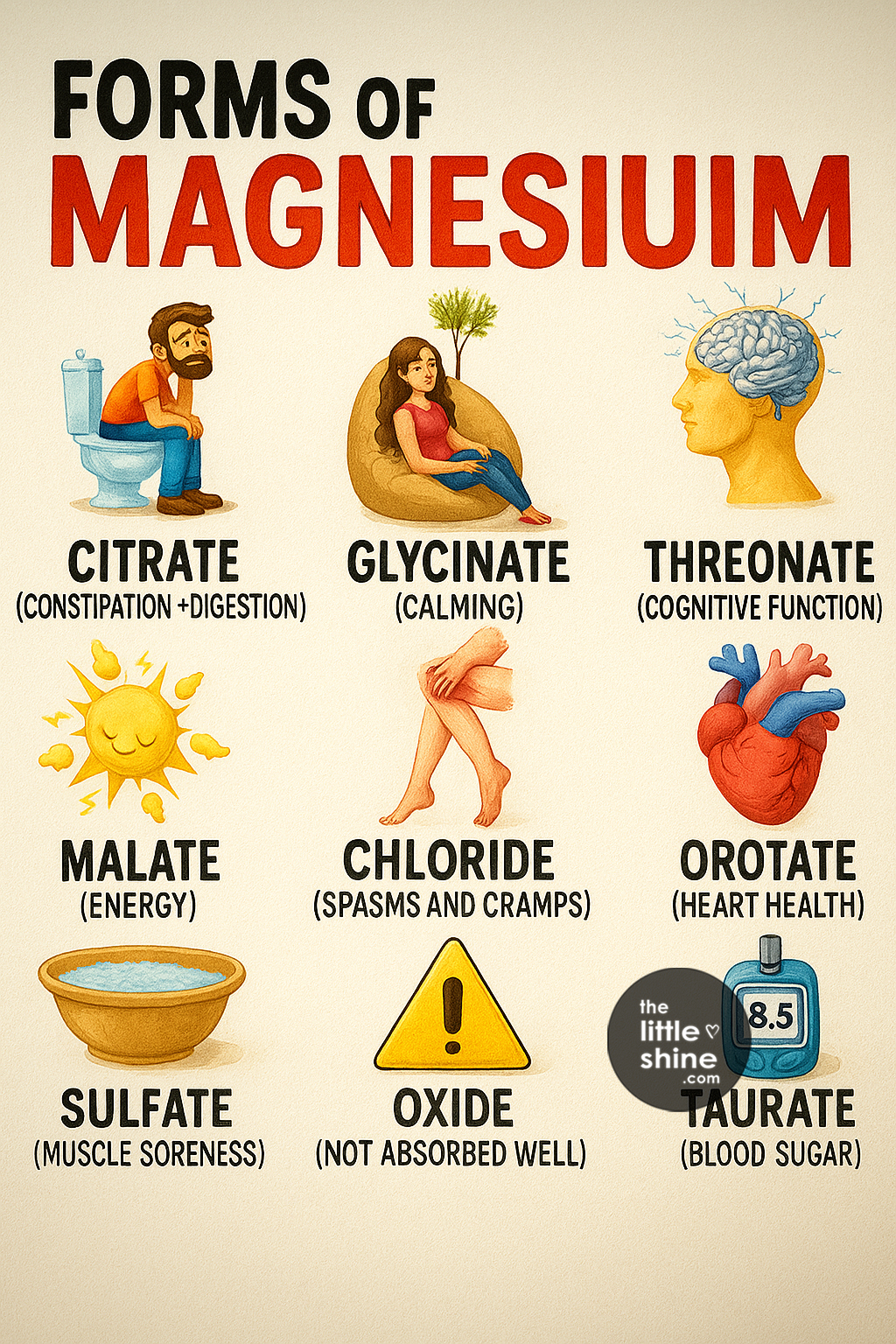What are the different types of magnesium? What type of magnesium is the best?
Well, check out this article for all the information on the types of magnesium, what they are, their benefits and their considerations before taking/using them.

Types of Magnesium
1. Magnesium Citrate
Magnesium citrate is a popular form of magnesium. It is known to be a saline laxative.
Benefits:
- Magnesium citrate can help relieve constipation.
- It can also support relaxation and sleep.
- This substance can helps reduce hot flushes, muscle cramps, mood swings and insomnia
What to Consider:
Magnesium citrate is highly bioavailable (well-absorbed into the body) and also is very budget friendly. It has a laxative effect (but care needs to be taken with higher doses).
2. Magnesium Glycinate
Magnesium glycinate is a supplement that combines the amino acid, glycine and the mineral, magnesium.
Benefits:
- Helps reduce the effects of migraine headaches, sleep, anxiety, restless legs and inflammation.
- Can improve sleep quality.
- Relieves hot flushes and mood swings.
What to Consider:
Optimum bioavailability (well-absorbed into the body). Does not have a laxative effect and is gentle on the stomach.
3. Magnesium Taurate
Magnesium taurate is a dietary supplement. It contains magnesium, along with the amino acid, taurine. It is also sometimes called magnesium ditaurate or magnesium taurinate.
Benefits:
- Can supports heart health, calmness, blood sugar balance and migraines.
- Magnesium taurate can help reduce sleep problems, calm anxiety and improve mood.
- Can also help improve bone density.
What to Consider:
High bioavailability and absorbs well into the body.
4. Magnesium Aspartate
This is a magnesium salt of aspartic acid and is commonly used as a mineral supplement.
Benefits:
- Can support cellular energy and fatigue.
- Reduces symptoms like hot flashes, irritability, mood swings and sleep disturbances.
What to Consider:
High bioavailability and absorbs well into the body. Best taken in the morning.
5. Magnesium Malate
It is a dietary supplement that combines magnesium along with malic acid.
Benefits:
- Supports: energy production, cellular energy & chronic fatigue.
- Reduces symptoms like hot flashes, irritability, mood swings and sleep disturbances.
What to Consider: High bioavailability and absorbs well into the body. Best taken in the morning.
6. Magnesium L-Threonate
Magnesium L-threonate is a form of the mineral, magnesium.
Benefits:
- Supports mental alertness, cognitive health, brain fog and increased energy.
- Can also help keep bones strong and reduce the risk of developing osteoporosis.
What to Consider:
High bioavailability and absorbs well into the body. Best taken in the morning.
7. Topical Magnesium (Chloride or Sulphate)
Topical magnesium is one that is applied to the skin in the form of a patch, spray or cream. It is nothing but a magnesium supplement.
Benefits:
- Supports muscle aches, restless legs, relaxation and sleep and skin health.
- Can also help keep bones strong and reduce the risk of developing osteoporosis.
What to Consider:
Epsom salts contain magnesium sulphate. Best used in the evening.
8. Magnesium Oxide
Magnesium oxide is an inorganic salt of magnesium. It is formed with ions of magnesium and oxygen.
Benefits:
- Will support menopausal symptoms but not as effectively as other forms of magnesium.
- Can potentially help to reduce the symptoms of menopause like hot flashes, mood swings and insomnia.
What to Consider:
Common and inexpensive. Poor bioavailability (doesn’t get well-absorbed into the body). Strong laxative effect.
